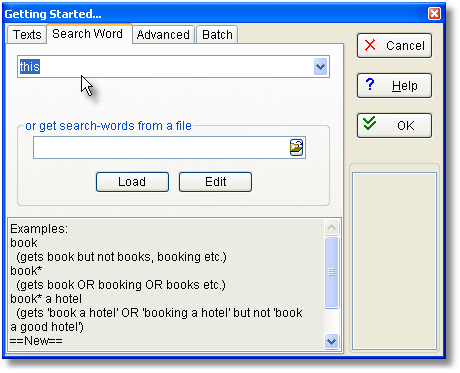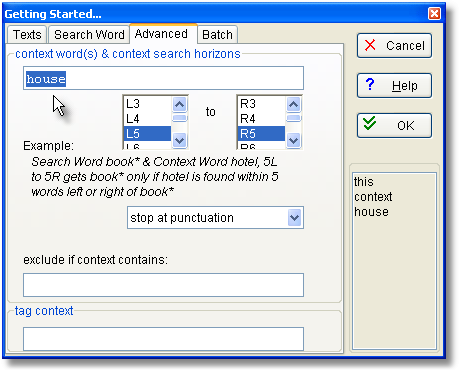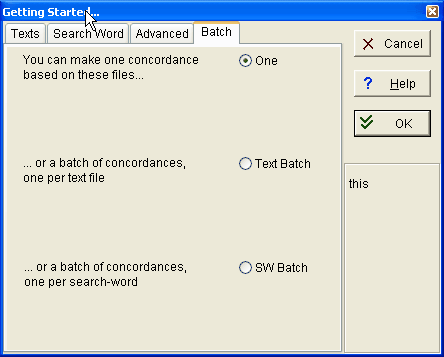Concord > concordance settings
Search Word or Phrase and/or Tag
Type the word or phrase Concord will search for when making the concordance, or (below) the name of a file of search words. You may also choose from a history list of your previous search words. For details of syntax, see Search Word Syntax or the set of examples shown in this screenshot:

If you want to do many concordances in a file-based search, first prepare a small text file containing the search words, e.g. containing
this
that
the other
==Major*==
Press the file button to locate your text file, the press the Load button. This will then change its name to something like Clear 4, where 4 means as in the example above that there are 4 different search-words to be concordanced. See "Batch" below for details on saving each one under a separate filename, otherwise all the searches will be combined into the same concordance.
Advanced

Context Word(s) and Context Search Horizons
You may wish to find a word or phrase depending on the context. In that case you can specify context word(s) which you want, or which you do not want (and if found will mean that entry is not used).
For example, if the search word is book* and the context word is hotel, you'll get book, books, booked, booking, bookable, but only if hotel is found within your Context Search Horizons. Or if the search word is book* and the exclusion word is hotel, you'll get book, books, booked, booking, bookable, as long as hotel is not found within your context search horizons. Or if the search word is book* and the exclusion word is booked, you'll get book, books, booking, bookable, but not booked.
Tag Context
The tag context is the context of tags as defined in your tag-file, to the left of the search-word. In this example, the tag context is <u speaker=Simon>:
.......<u speaker=Simon> Between you and me, I wish I hadn't booked that hotel ....
The tag context actually can include a bit more than that -- if this chunk is in <section 1>, and there is a tag showing the end of section 1 (probably </section>) which occurs anywhere to the right of the search-word, then the full tag context might be <section 1><u speaker=Simon> or even more. So a tag context is actually the whole set of tags which are still in operation at the point where your search-word was found.
You may wish to find a word or phrase depending on the tag context. In that case you specify tag attributes which you require.
For example, if the search word is book* and the tag context is Simon, you'll get book, books, booking, bookable, booked only if Simon is found in the tag context.
Batch
Suppose you're concordancing book* in 20 text files: you might want One concordance based on all 20 files (the default), or instead 20 separate concordances in a zipped batch which can be viewed separately (Text Batch). If you have multiple search-words in a file-based search as explained above, you may want each result saved separately (SW Batch).

Other settings affecting a concordance are available too:
see WordSmith Controller Concordance Settings;Accented characters; Choosing Language, Context Word(s) & Context Search Horizons